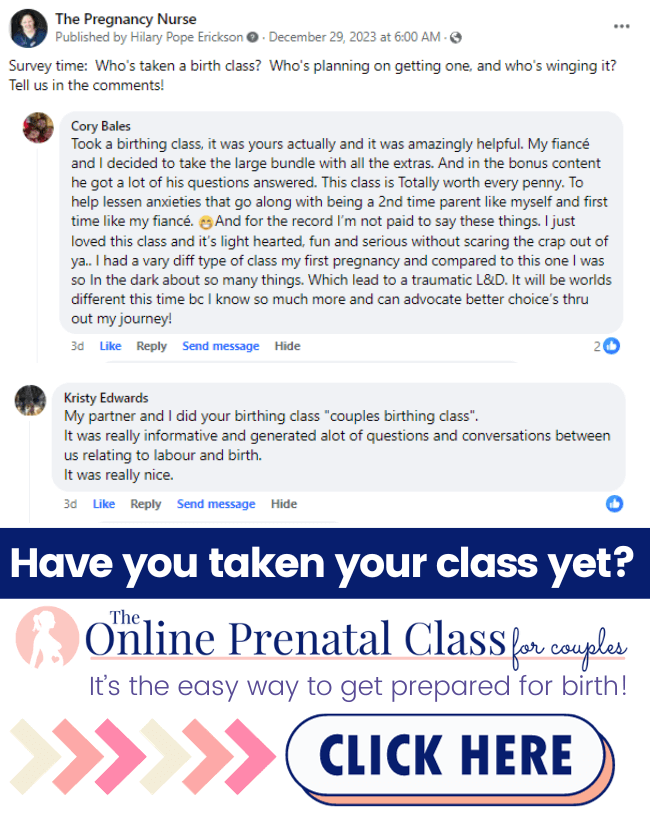👋 I’m so glad YOU are here. Are you looking to also get your partner prepared? This is for BOTH of you. Couples just love it and I know you want to both feel prepared!
Becoming a mom is one of the most rewarding experiences in life, but it can also be overwhelming. That’s why it’s important to do your research and weigh the pros and cons of all your birthing options before making a decision. In this post, we’ll take a look at the pros and cons of midwife-led births. Keep in mind that every woman’s experience will be different, so make sure to speak with your doctor or midwife about what to expect during labor and delivery.
But first, how do I know all of this?
Hi — I’m Hilary — The Pregnancy Nurse 👩⚕️. I have been a nurse since 1997 and I have 20 years of OB nursing experience, I am also the curly head behind Pulling Curls and The Online Prenatal Class for Couples. 🩺 I have worked with TONS of different delivering providers including both midwives and doctors and I have also talked to LOTS of patients wondering what they should do, so I’m a pretty good expert on this topic!
Now, when people say they’re going to see midwives, a lot of people freak out because a lot of people just think of home delivering midwives in that situation, but there are lots of different types of midwives. I sort of wish we called them something different, as they vary in experience and training…
I have a whole podcast episode where I review the different people who can deliver your baby:
What are the different types of midwives?
There are several different types of midwives, including:
Certified Nurse-Midwives (CNMs)
A certified nurse-midwife (CNM) is a registered nurse who has completed graduate-level training in midwifery (often a PhD program anymore). CNMs are qualified to provide a full range of primary care services to women, including well-woman care, family planning, gynecological care, and care during pregnancy, labor, and delivery. In most states, CNMs are also able to prescribe medication.
Some CNM’s are also trained to care for your baby for the first year as well.
These midwives can deliver in the hospital or birth centers. In some states they may also do home births as well.
Certified Professional Midwives (CPMs)
A certified professional midwife (CPM) is a midwife who has completed a nationally recognized education and training program and has passed a standardized national exam. The training and qualifications vary state to state and program to program.
These midwives deliver in birth centers or at home births.
Direct-Entry midwives
Direct-entry midwives are midwives who have not first become registered nurses. Instead, they enter the profession of midwifery directly after completing a midwifery education program.
I actually know the least about these.
Lay Midwives
Lay midwives are midwives who have not completed a formal midwifery education program. Instead, they learn through apprenticeship or self-study. It is similar to how a plumber or electrician would train except they aren’t licensed. There is no standard way to know what training or apprenticeships they’ve had.
For this article I will be concentrating on Certified Nurse Midwives as that is what I have the most experience with. I also think that experience with the other typs of midwives varies quite a lot, since their training varies quite a lot.
Wait, what is a Doula?
A lot of people think that a Doula is a midwife, but they actually don’t have any medical skills to do things at the delivery. Their main training is helping support moms during labor and delivery. More like an educated support person.
If you like all this information from the labor room, don’t miss this class. It has TONS of information it guarantees it will you prepare you for your birth.
The Thing to Remember About Midwives
The main thing to know about midwives is that they are meant for un-complicated births and pregnancies. If there are complications that arise, a good midwife will hand you over to an OB/GYN who can more completely take care of you.
We’ll talk more about what those types of things are later in this article.
Pro’s of Midwives
More natural approach – Midwives generally have a more natural approach to birth than doctors. They are more likely to let you labor in whatever position is most comfortable for you and they are less likely to use intervention such as forceps or vacuum extraction. In general they’re more open to lots of different things as they are dealing with a low-risk population.
Lower c-section rates – The c-section rate for midwife-led births is much lower than the c-section rate for doctor-led births. In fact, a large meta-analysis found that the c-section rate for midwife-led births was 24% lower than the c-section rate for doctor-led births. We will discuss these types of studies later in the article, but you should also be aware that a midwife can not perform a cesaren section unless the mom or baby is in an extreme emergency. They would pass that patient on to an OB/GYN.
More personalized care – Midwives provide more personalized care than doctors. They get to know you and your family on a more personal level and they are usually more open to hearing your preferences for your birth. In general, your appointments will be longer and more comprehensive with a midwife than with a doctor.
Pro tip: I am speaking entirely in generalities here. I have seen OB/GYN’s who practice more like a midwife, and I’ve seen midwives who practice more like a doctor, so it is really important that you decide on your specific provider/practice and not just how they are licensed to deliver you.
Continuity of care – With a midwife, you may have more continuity of care, which means that you will see the same midwife throughout your pregnancy, labor, and delivery. This can be very beneficial as it allows you to build a relationship of trust with your care provider. That being said, many midwives also have large practices where you may see a variety of people (which can be both good and bad). And you never know which provider will deliver you (it will be based on who is on call).
BUT, midwives tend to stay with the patient longer than an OB/GYN does. Often they will be in the hospital for the entirety of your labor, and will be at the bedside a lot for you. Most often with OB/GYN’s you won’t see them until the baby is almost out, but the midwife is often there to help you push.
Again, this will vary by their office and how they practice.
Lower intervention rates – Midwives are less likely to use interventions such as induction, augmentation, epidurals, and forceps/vacuum extraction. Studies also show that midwife patients are less likely to have an epidural as well.
Con’s of Midwives
Limited availability – In some areas, midwives are in limited supply, which can make it difficult to find one. Some hospitals or health care systems don’t allow midwives to practice in them. So, if your heart is set on a specific hospital, you may want to see if midwives are “allowed” to practice there (the hospital has to have specific policies and practices in place in order for midwives to practice there).
Limited scope of practice – In some states, midwives are not allowed to prescribe medication or perform certain procedures, such as episiotomies, forceps or vacuums.
Not covered by all insurance plans – In some states, midwives are not considered primary care providers and are not covered by insurance plans. I find this to be more true of midwives who are not in the hospital.
Not be as experienced as some doctors – Some people feel more comfortable with a doctor who has more experience. This is something that you will need to weigh when deciding between a midwife and a doctor. Remember, midwife is meant for low-risk things. They need to know when they are “over their heads” and when to pass that patient onto a doctor.
What do the studies show between doctors and MIdwives:
First off, remember that a good CNM will NOT take a high risk patient. They will refer them to an OB/GYN and a higher level of care. These types of issues can include:
- Twins or other multiple gestations
- High blood pressure
- Advanced Maternal Age (some will take 35-40 but will refer out >40)
- Gestational Diabetes, or pre-existing diabetes
- Increased BMI
- Issues with previous births.
So, as we look at the studies, remember that the OBGYN’s are already starting out with ALL the high risk births, which will likely have increased interventions and possibly poorer outcomes to start with. That isn’t something mentioned with a lot of the studies, but I think it is important to note initially.
This study talked about who normally sees a midwife vs a doctor.
In general it showed that women who tended to want something beyond the “birth norms” picked a midwife and were ultimately more satisified with their care.
This study showed that less than 10% of births in the US are attended by midwives, but they do have less interventions and similar outcomes.
This study showed that higher educated women tended to choose midwives. They had less interventions, were more likely to use “natural pain management methods” and felt more encouraged in their decision making
This study again showed lower intervention rates and similar outcomes for the babies.
So, what’s your verdict? What’s best for you? Midwives or doctors?
Unfortunately, there is no easy answer. Both have their own set of pros and cons that must be weighed carefully before a decision is made.
As I said before, be sure to look at each provider individually to make sure they are meeting your needs. I think you’ll find a perfect one just for you (and don’t be afraid to switch if you’re not finding what you like — just be sure to try and do it before 30 weeks or so).
One thing that doesn’t change midwife or doctor is learning some background information about birth. It will help you communicate better, and make better choices as you head into delivery.
This class can be done in just a few hours, on your own timeframe. It’s also going to help you prepare for this big life change together!
Want to do a vibe check before diving into the whole thing with me? — check out my free labor pro tips. It’s your first step toward getting in the driver’s seat of your birth.






 Can Getting a Pedicure Induce Labor?
Can Getting a Pedicure Induce Labor?
